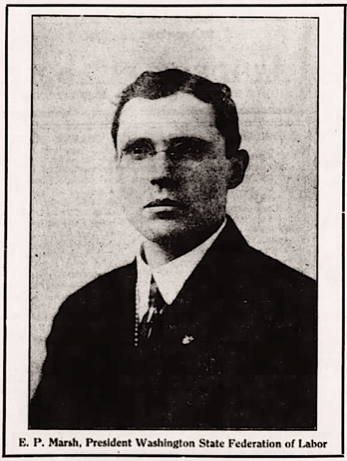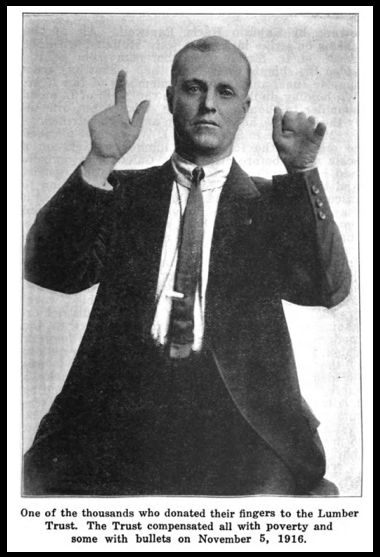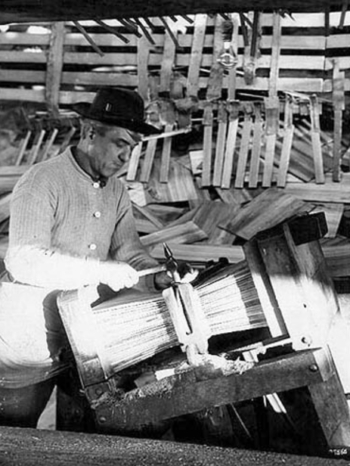You ought to be out raising hell.
This is the fighting age.
Put on your fighting clothes.
-Mother Jones
~~~~~~~~~~~~~~~~~~~~~~~~~~~~~~~~~~~~~~~~~~~~~
Hellraisers Journal, Saturday February 17, 1917
From Everett Labor Journal: Report on Industrial Warfare, Part III

Over a period of three weeks, from January 26th to February 9th, The Labor Journal of Everett, Washington, published the “Report on Everett’s Industrial Warfare,” by E. P. Marsh, President of the Washington State Federation of Labor, which report he had delivered on Monday January 22, 1917, the first day of that bodies annual convention. Hellraisers Journal republished Part I of that report on Thursday; we offered Part II yesterday, and we conclude the series today with Part III of the Marsh Report.
EVERETT’S INDUSTRIAL WARFARE, PART III
EVERETT’S INDUSTRIAL WARFARE;
REPORT OF PRESIDENT E. P. MARSH
—–
Shingle Weavers Declare
a TruceA dangerous situation existed in Everett after the battle of November 5. Public feeling ran high and anything might have happened. Half a thousand citizens were under arms enraged at the Industrial Workers of the World and deadly determined to stamp out their organization in Everett. It is no exaggeration to say that, literally thousands of the working people of Everett were just as enraged toward the members of the Commercial Club who participated in the gun battle. I felt that the time had come when something simply had to be done to ease off the tense situation. As an instance of how high feeling ran let me tell you that on the following morning the mayor of the city appeared on the picket line with a high power rifle and told the union pickets that he had every reason to believe that an attempt might be made by snipers to pick them off. He asked them to scatter as much as possible, make no demonstrations whatever and declared he would defend them with his own life if necessary.
Within an hour after the battle I was in touch with Governor Lister over the situation. He advised me that he had sent the state adjutant general to Everett and would cancel all his remaining campaign engagements and come to Everett and personally take charge of the situation if I thought it necessary. One after another I got in touch with prominent ministers, attorneys and others whom I thought would act and suggested that a conference be immediately called to discuss the situation. On Monday morning a representative gathering met. Several of the most prominent men of affairs, in the city attended that conference. International President Brown, State Labor Commissioner Younger and Federal Mediator Blackman were also in attendance.
For hours this body of men reasoned and always they came back to the opinion that as a first step toward restoring industrial sanity the Shingle Weavers strike must be ended. “In this crisis that faces the city, call off your strike,” said they, “and you will have served your city nobly.” We asked them if they realized what they were asking of men who had braved danger, gone hungry, deprived their little ones of the necessities of life, for long weary months in defense of a wage principle. We urged them to use all their influence with the mill men to get them to also make some concession in the interests of the city’s welfare, to give us some assurance to take back to the men that the employers, too, recognized the danger of the situation and were ready to do something for the common good. They promised to do that and we adjourned until Wednesday morning.
When Wednesday morning came the same men gathered and reported that no concessions whatever could be obtained from the mill owners while the strike continued. Unconditional surrender was the price the weavers were asked to pay to restore order to a strife torn community. And we sat and marveled that men could lay claim to every virtue, boast loudly of their patriotism, wrap the flag of their country about them in their defiant attitude and declare they were fighting for a principle, to-wit: the “right of the free and independent workman to work for whom he pleased, when he pleased and for what he pleased.” We said to these men, “The Weavers will meet this afternoon; come down and tell them what you have told us.” They agreed and frankly laid their cards face up before the men that afternoon. They told them that if it were within their power the wage demands would be granted; they told them that if the weavers would declare the strike off, relieving the tension it was felt the picket caused, they would leave no stone unturned to induce the mill owners to grant the increase asked.
This meeting lasted the entire afternoon and far into the night. The weavers resented the idea of calling off their strike after they had put up for months a most wonderful battle, suffered untold privations. “It is always labor that must comprise and sacrifice and concede,” they said. But they did finally call off their strike, knowing their motives would be misunderstood by many, that they would be called quitters. The Everett Shingle Weavers never rose to manlier heights than in that hour of sacrifice and self-abnegation. The sinking of their own desires, passions and prejudices in that hour of stress and bitterness is the brightest chapter in all the history of that organization.
After the strike was called off the strongest kind of effort was put forth to induce the mill owners to meet the wage demands by business and professional men prominent in the city. The defiant, unyielding attitude of the mill owners throughout this entire conflict has been a source of wonderment to the believer in fair play. The weavers time after time agreed to submit their case to any fair method of arbitration. William Blackman, representative of the federal department of mediation and conciliation, made trip after trip to Everett in an effort to bring the contending forces together, but always met by the stubborn, unyielding attitude of the mill operators that they had nothing to concede. The only method of arbitration-if it could be so called-to which Governor Clough [former Governor of Minnesota], representing the owners, ever agreed, was the following proposition made by him. Judge of its fairness or unfairness for yourself.
The mill owners or the Commercial Club acting for them, were to select one man, the Everett Trades Council to select one and the Mayor to select a third, these three men to constitute an arbitration board. The Governor would not agree to abide by the findings of the Board and he would not allow the committee to have access to its books or manufacturing data in conducting its investigation. The Governor expressed it that “the price of logs was a matter of common knowledge, everybody knew the price of shingles, the board could easily figure it out.” The proposition was the merest farce and the weavers naturally turned it down by a practically unanimous vote.
Absolute failure for weeks upon the part of interceding parties to secure the payment of the wage scale in controversy, the strike was again called on by the Everett union and is still in effect at this writing. Wages have been forced up. However, two of the mills affected now being reported to be paying the union scale throughout while others have materially advanced the wage, though not up to the union schedule.
The splendid financial support accorded the Everett Weavers by the labor movement of the state has made it possible to continue this effective picket line. A universal car shortage cut off for a time almost entirely outside support from other weavers as plants were either closed entirely or running scant time. In this emergency the trade union movement was appealed to and splendidly responded furnishing an object lesson in the growing solidarity of our labor movement.
Official Investigation
Early in December, I wrote each of our representatives in Congress urging a congressional investigation into the industrial situation in Everett. I received replies from the majority of the delegation in Congress, expressing sympathy for such an investigation and a willingness to aid if it could be brought about, but at the same time expressing the belief that it would be extremely difficult to secure such an investigation, because of the purely local nature of the controversy, the limited radius of territory and industry affected. I would urge upon this convention that it renew the effort to secure such an investigation, to the end that all facts in connection with the whole situation may be established and made a matter of common knowledge through official government channels.
The Public’s Responsibility
There are lessons to be drawn from this long continued struggle and if society learns those lessons, even the bloodshed on that red Sunday will not have been shed in vain. A different policy is noticeable on the part of newly qualified county peace officials toward the handling of the industrial situation which leads us to believe that common sense and discretion will be mixed with firmness in the policing of the county in time of industrial disturbance, a combination that was sadly lacking during the past administration.
Organization is the most instinctive attribute of human relationship. Men who thought alike upon any subject under the sun band themselves together into some sort of association for the promotion and study of that subject. Organizations of labor bring out the elemental instincts in men because they have to do with the struggle of man to exchange his labor power for the sustenance of life, and the struggle to maintain life is elemental. It has always been a struggle of tooth and claw. The first instinct of men who work with their hands is physical. They earn their daily bread by the use of physical force and their instinct is to settle their labor problems with that physical force. They will withhold that force to compel the granting of some labor condition, or they will use it under strain of excitement or in sudden anger against those whom consider to be beating down their working conditions. That is the primal, the instinctive nature of brute force.
The use of diplomacy, of finesse the invoking of legislation, is more subtle, more slowly grasped, and can make strides only as the mass is educated up to a higher level. Education is going on all the time in the labor movement. The worker is almost passionate in his demand for a system of school education which will develop the brain power of his children, realizing the mastery of brain over brain. It is because so many good people do not understand this evolutionary process going on in the working world, that they condemn trade unionism because of its physical signs of violence. As the workers become educated and disciplined, physical combat declines and the settlement of labor disputes becomes a duel of brains rather than fists. Witness the Typographical Union, which has almost entirely done away with strikes and lockouts.
The general public has a keen interest in all labor problems, for the hand of labor touches every phase of life’s activity. None can escape the consequences of industrial strife and all share in industrial amity and peace. There was a time when the cloud on Everett’s industrial horizon was no larger than a man’s hand before passion and bitterness rocked the forces of industrial society. That was the time when constructive work might have been done by outside forces toward bringing both labor and capital to amicable terms which would have prevented such shocking occurrences. When Everett was stunned with tragedy, in the crisis, the weavers listened to the advice of outside interests. Might they not have listened to that same advice when they were about to repudiate the principle of trade agreements, a time when sober advice was needed, when the mill owners were in a conciliatory frame of mind?
The general public has no right to stand idly by while the seeds of industrial bitterness are being sown, intent upon its own affairs, and then, when trouble comes which draws it into the maelstrom of disaster, complain loudly that an “innocent third party” is suffering. There is no “innocent” third party.
It sometimes takes a cataclysm to jar us loose from our self complacency. It took murder to drive home the truth that you cannot kill an idea with a club or a gun. George the Third tried that-and lost the American colonies.
Regrettable as are the occurrences that marked the year of 1916 in the city of Everett, mistaken the policy of citizens and authorities, if an era of better understanding of these vexing social and industrial problems shall dawn, if the law of reason gain the ascendancy over the law of force, if the different elements of society shall in the end work more harmoniously and charitably together, the brutality, the suffering, the monetary loss, will be more than compensated for in the knowledge that we are perceptibly nearer the golden era when old things shall be swept away, when the dross and impurities in man’s nature shall be purified in the better understanding of mankind.
Fraternally submitted,
E. P. MARSH,
President[Photographs and paragraph breaks added.]
~~~~~~~~~~~~~~~~~~~~~~
SOURCE
The Labor Journal
(Everett, Washington)
-Feb 9, 1917
http://chroniclingamerica.loc.gov/lccn/sn88085620/1917-02-09/ed-1/seq-1/
http://chroniclingamerica.loc.gov/lccn/sn88085620/1917-02-09/ed-1/seq-3/
IMAGES
E. P. Marsh, Everett Labor Journal, July 23, 1915
https://www.newspapers.com/image/64503768/
Everett Massacre, Fingers Donated to Lumber Trust, WCS
https://babel.hathitrust.org/cgi/pt?view=image;size=100;id=mdp.39015002672635;page=root;seq=39;num=33
Washington Shingle Weaver, ab 1915
http://depts.washington.edu/labhist/strike/emerson.shtml
See also:
Hellraisers Journal, Thursday February 15, 1917
From Everett Labor Journal: Report on Industrial Warfare, Part I
https://weneverforget.org/hellraisers-journal-part-i-report-on-everetts-industrial-warfare-by-e-p-marsh-president-washington-state-f-of-l/
Hellraisers Journal, Friday February 16, 1917
From Everett Labor Journal: Report on Industrial Warfare, Part II
https://weneverforget.org/hellraisers-journal-part-ii-report-on-everetts-industrial-warfare-by-e-p-marsh-president-washington-state-f-of-l/
“The International Shingle Weavers of America”
By Philip C. Emerson
http://depts.washington.edu/labhist/strike/emerson.shtml
American Trade Unionism
-by George M. Janes, Ph.D.
Chicago, 1922
https://archive.org/stream/americantradeuni00jane#page/n7/mode/2up
Chapter III: The Shingle Weavers
https://archive.org/stream/americantradeuni00jane#page/24/mode/2up
For links to more sources related to
the International Shingle Weavers’ Union of America:
http://socialarchive.iath.virginia.edu/ark:/99166/w6w70vmq
The Everett Massacre
A History of the Class Struggle in the Lumber Industry
-by Walker C. Smith
IWW, 1918
https://catalog.hathitrust.org/Record/001106557
http://www.gutenberg.org/files/31810/31810-h/31810-h.htm
Biennial Report of the Bureau of Labor
of the State of Washington, 1917-1918
-by C. H. Younger, Commissioner
Washington State Bureau of Labor, 1918
(search with: everett)
https://books.google.com/books?id=vSIoAAAAYAAJ
David Marston Clough, 13th Governor of Minnesota
https://en.wikipedia.org/wiki/David_Marston_Clough
~~~~~~~~~~~~~~~~~~~~~~~~~~~~~~~~~~~~~~~~~~~~~


